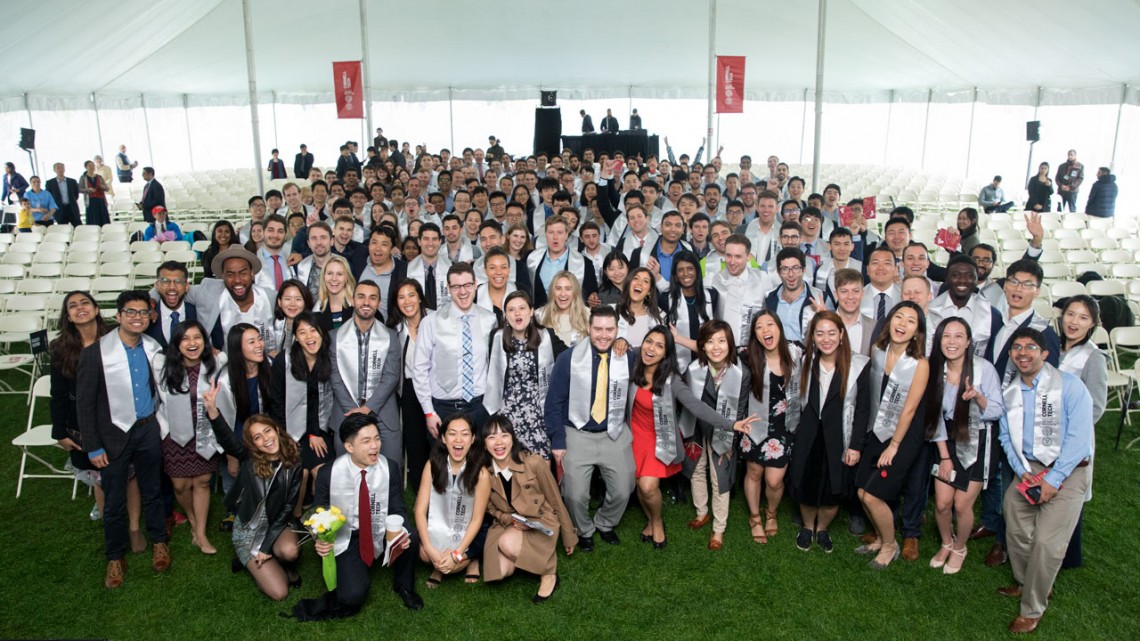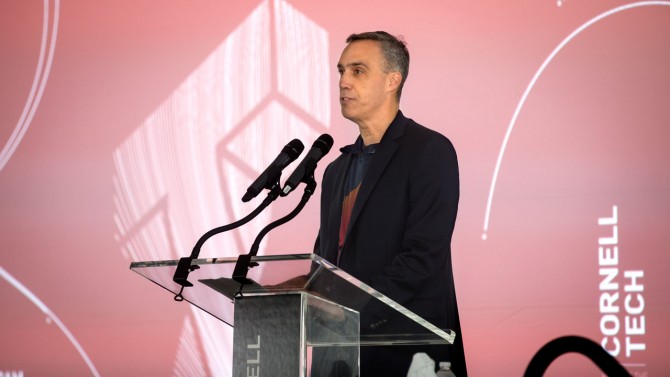
Cornell Tech students at their May 19 Recognition Ceremony.
Weekend highlights Cornell Tech grads’ solutions to global problems
By Jon Craig
On May 19, Cornell Tech announced that four student startup teams won co-working space in the Tata Innovation Center on Roosevelt Island and pre-seed funding amid fierce competition from dozens of other Cornell Tech classmates.
The awards followed Open Studio presentations on May 18 highlighting students’ computer-based innovations that seek to advance research, health care, food programs, transportation and fashion
For example Crater, a local news-gathering application, aims to spur local engagement by pairing intuitive storytelling templates with easy-to-use video editing tools and making them available to people interested in telling stories about their communities.
Winners of the pre-seed funding were:
Kipit, which builds devices that automatically track personal items in backpacks or purses and alerts you before you leave anything behind.
Sarah Le Cam, who received her master’s in engineering in computer science this spring, said Kipit is designed to simplify life and keep smart people from feeling like they are losing their minds over misplaced items like cellphones, keys or lipstick. Trackers are placed on those items, and a computer program tracks them and reminds users where they are as they head out for school or work. If you’re missing anything, a notification is sent out until it’s located,” Le Cam said.
ReverCare, which connects families to resources and coaches to ease the burden of caring for elderly loved ones. Kiyan Rajabi, Technion-Cornell Dual Master’s Degrees in Health Tech ’18, said the app, which will launch in June, was the result of seeing his mother care for his 88-year-old grandmother following a stroke.
TogethAR, an augmented reality platform that uses mobile technology to foster real-world impromptu social collisions through collaborative gaming experiences. Elena Zhizhimontova, Master of Computer Science ‘18, said the technology aims to replace board games. The Cornell team also came up with a program where cellphone players can participate in a flash mob outside establishments like Starbucks, attracting internet fame while generating revenue.
“We believe games are better when they are played together,” Zhizhimontova said.
An estimated 800 million illiterate people worldwide are unable to use smartphones to their full capacity. The final recipient of the Startup Awards was litOS, a mobile operating system that uses voice-assisted technology and images instead of words. Students said 287 million potential users are in India alone and that there is a very real market for growth.
In his opening remarks at Open Studio, Dan Huttenlocher, the Jack and Rilla Neafsey Dean and vice provost, reiterated the interdisciplinary strength of Cornell Tech’s programs, which blend master’s students from seven different programs including engineering, computer science, law and business.
“We first force, and then support, students with different backgrounds and experiences, working together,” Huttenlocher said.
“With the Startup Awards, Cornell Tech provides student teams the support they need to kickstart their creative ideas after graduation. We’re proud of the ambition our students have shown in forming companies that pursue innovative solutions to real-world problems,” said David Tisch, head of Startup Studio at Cornell Tech and managing partner of BoxGroup, and early stage investment fund.
Open Studio also offered “demo rooms” featuring video and interactive displays of student tech projects. Aside from the academic accolades, a new Cornell Dairy ice cream flavor – Dean Dan’s Big Apple Pecan, named after Huttenlocher and developed by Mike Bloomberg, MBA ’18, and Vu Francois, MBA ’18 – was served as part of the festivities.
Jon Craig '80 is a writer based in New York City.
Media Contact
Get Cornell news delivered right to your inbox.
Subscribe


